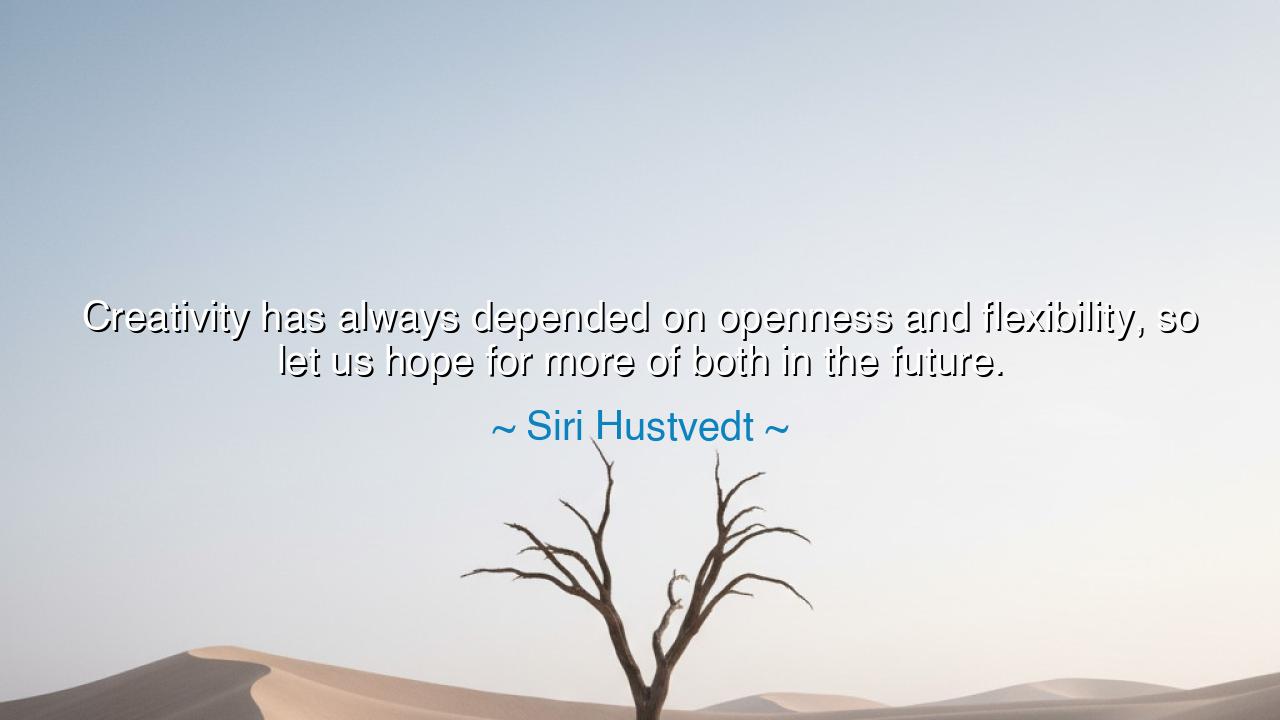
Creativity has always depended on openness and flexibility, so
Creativity has always depended on openness and flexibility, so let us hope for more of both in the future.






In the grand flow of human history, there are moments when new ideas, new forms of expression, and new ways of seeing the world emerge—ideas that change the course of civilization. Siri Hustvedt’s words, "Creativity has always depended on openness and flexibility, so let us hope for more of both in the future," remind us that the creative spirit is not confined to rigid frameworks, but thrives in the freedom to explore, adapt, and reimagine. Creativity, in all its forms, has always demanded the ability to move beyond the limitations of the known and to embrace the unknown with courage and flexibility.
In the ancient world, the philosophers understood the importance of openness to new ideas. Socrates, for instance, questioned the very foundations of truth and knowledge, always challenging the status quo with his method of dialectic—asking questions, seeking new perspectives, and adapting his thoughts as he encountered new ideas. Socrates believed that wisdom arose from the constant willingness to explore, to question, and to remain open to the fluidity of truth. His way of thinking, grounded in the belief that knowledge is ever-evolving, underscores Hustvedt’s reflection that creativity thrives not in stagnation, but in a continuous process of change and adaptation.
Similarly, Plato in his Republic envisioned the ideal society where individuals were encouraged to explore the depths of their talents and engage in open dialogue with each other. It was in this exchange of ideas, under the guiding principle of intellectual flexibility, that the greatest innovations were born. Artists, philosophers, and scientists alike, from the ancient world to the Renaissance, achieved greatness by freeing themselves from the chains of conventional thought and embracing the fluidity of creativity. It is this ancient wisdom that Hustvedt echoes in her call for openness and flexibility to be nurtured in the future.
Consider the Renaissance, that era of unparalleled creativity, where figures like Leonardo da Vinci and Michelangelo brought art and science into a harmonious fusion. Da Vinci, in particular, embodied the essence of openness and flexibility in his work. He did not limit himself to the conventional boundaries of painting or sculpture but ventured into anatomy, engineering, and aviation, blending disciplines with an eagerness to understand the world in all its complexity. Da Vinci’s work, born from a mindset of curiosity and adaptability, serves as a testament to the boundless potential of the creative spirit when one remains open to all that is possible.
Throughout history, when societies embrace flexibility and openness, they are able to foster periods of extraordinary growth and creativity. The Scientific Revolution in the 16th and 17th centuries, for example, marked a time when the old views of the world were overturned in favor of new discoveries. Think of Galileo, whose curiosity and willingness to challenge the dogmas of his time led to the invention of the telescope and the discovery of celestial bodies that revolutionized our understanding of the universe. It was through the flexibility to explore beyond the established frameworks of thought that the age of enlightenment was born, one where the imagination could soar and give rise to ideas that changed the world.
Hustvedt’s words also echo the ever-present truth that creativity is not a linear path but a journey that requires adaptability. The artist or innovator must remain open to failure, to mistakes, and to the inevitable uncertainty that accompanies the creative process. This is evident in the lives of the great inventors—Thomas Edison, who failed thousands of times before inventing the light bulb, and Marie Curie, whose tireless research and experiments led her to uncover the mysteries of radioactivity, despite facing immense personal and professional challenges. They understood that true innovation requires an unwavering flexibility, a willingness to shift and evolve, even when faced with uncertainty and setback.
The lesson from Hustvedt’s words is clear: if we wish to create a world filled with innovation and progress, we must cultivate openness and flexibility in every aspect of our lives. Creativity does not flourish in rigid systems but in environments that encourage growth, where ideas can flow freely and where failure is not an end, but a stepping stone toward discovery. Just as the ancients celebrated those who were willing to question and challenge the accepted truths, so must we today honor the spirit of inquiry and adaptability. The future will belong not to those who hold tightly to old ways of thinking, but to those who remain open to new possibilities and who can bend with the changing tides of time and innovation.
Let us then strive to live with the openness of the philosophers, the flexibility of the great artists and inventors, and the courage to embrace the unknown with the same boundless spirit that has defined the greatest moments of human history. Like the great thinkers of the past, we too must continue to question, to create, and to adapt. Only then will we ensure that the world we leave behind is one that is vibrant, innovative, and full of possibilities for generations to come.






AAdministratorAdministrator
Welcome, honored guests. Please leave a comment, we will respond soon